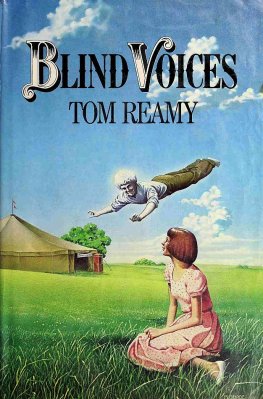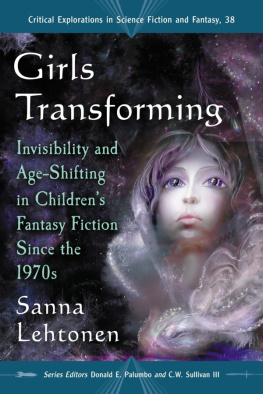It was a time of pause, a time between planting and harvest when the air was heavy, humming with its own slow, warm music. Amber fields of ripe wheat, level as skating rinks, stretched to the flat horizon and waited for the combines that crawled like painted-metal insects from Texas to the Dakotas. Dusty roads lined with telephone poles made, with ruled precision, right-angle turns at section lines separating the wheat from green fields of young maize.
Farmers stood at the edges of the fields, broke off fat heads of wheat and rolled the kernels between their fingers, squinting at the flat blue sky. The farmers wives, finished with the dinner dishes, paused before going back into the hot kitchens to begin a long afternoon of cooking, doing it all again for supper. They sat on the front porches in the shade, trying to catch a nonexistent movement of air. They spread apart the collars of their dresses and fanned their necks with cardboard fans printed with a color picture of the bleeding heart of Jesus on one side and an advertisement for the Redwine Funeral Home on the other.
Then the farmers turned their attention from the sky to the road. Their wives stopped fanning and leaned forward in their chairs. Children paused in their chores and their play and shaded eyes with hands. They looked at each other and grinned, feeling excitement tightening in their chests like clock springs.
In that long-ago summer afternoon in southern Kansas, when the warm air lay like a weight, unmoving and stifling, six horse-drawn circus wagons moved ponderously on the dusty road.
A two-horse team pulled each wagon, their heads drooping slightly, their shod hoofs dragging a bit before lifting to take another plodding step. The six drivers dozed in the heavy dusty air, holding the reins lightly, letting the horses choose their own pace. The wagons creaked and groaned as they swayed; rattled and jolted when the wooden, iron-rimmed wheels bounced in chugholes.
The wagons were a little shabby, their once-bright paint doubly-dimmed from sun and dust. The sides of the wagons promised miracles with gilt curlicues and wonders with gingerbread flourishes. Shaking and rattling and squeaking, the wagons were a gallery of marvels, a panorama of astonishments.
The drivers reined in the horses and the line of caravans creaked to a halt when they met the black Model-T Ford arriving in a billow of dust from the opposite direction. The car pulled off the road into the shallow ditch filled with the red, yellow, orange, brown, black, and purple of Indian paintbrush, black-eyed Susan, and Russian thistle.
The man who stepped from the car was nattily dressed in a dark gray pin-striped double-breasted suit and a pearl-gray fedora. Louis Ortiz was thirty-two, handsome in a swarthy way, carefully cultivating his more imagined than real resemblance to Rudolph Valentino. A smile hovered over his full lips, ready to alight, but his eyes were as cold as steel balls.
Louis looked into the glowing eyes painted on the lead wagon, and they looked back at him, fiercely, beneath a brow cleft almost in two by a widows peak spearing down from varnished black hair. The mouth was thin and stern and uncompromising. Louis shifted his eyes to the second wagon, to the portrait painted therethe portrait of a pale and beautiful young boy, a gilt corona painted around his white curls, his white-robed arms uplifted, his face beatific and rapturous.
The smile almost alighted on his lips.
He walked to the rear of the first wagon and propped his foot on the step, wiping the dust from his black patent leather shoe with a white handkerchief. The caravan door opened and a man stepped out. He was an older version of his portrait. His hair was not so sleek nor so black, his face not so smooth nor firm, but his lips were just as uncompromising. He wore a black satin robe and carpet slippers, like some Oriental alchemist. He waved his hand petulantly before his face to clear away the floating dust and looked inquiringly at Louis.
Louis flipped the dust from his handkerchief and folded it into his breast pocket. Were all set, he said with no trace of the Latin accent his appearance would suggest. The posters are up with the merchants. I rented the vacant lot and got a permit from the sheriff.
He looked up at the older man, squinting in the sun, and the smile settled softly. Theres only one thing that might be a problem.
The other man raised an eyebrow.
The movie house, Louis continued, will be showing their first talking picture tonight. Its the main topic of conversation in town.
The older man grimaced. Theres always one petty annoyance after another. It would be very pleasant if this movie palace were to burn to the ground.
It neednt be that drastic.
Perhaps youre right, he sighed. The unpleasant bumpkins might blame us. This trip has been extremely wearisome. We should head back east where the towns are closer together.
Louiss mouth twitched slightly and the other man frowned. Im sure you will think of something, Louis. Youre a very clever man.
Louis grinned and made a slight bow with his head.
How much further to this prairie metropolis?
Hawley, Louis answered. About ten miles. Theres a little place two miles ahead called Millers Corners. You can rest and water the horses there. Hawleys eight miles beyond that.
The man shrugged with massive indifference. Louis returned to the car, still smiling slightly. The man stood in the doorway of the caravan watching the car turn around to chug and rattle back the way it came. He grimaced at the fresh cloud of dust and went back inside, closing the door. The wagons began to move.
He opened a door in the partition dividing the wagon in half and stopped, leaning against the door frame. He looked for a moment at the pale, naked boy lying on the bunk, and then sat on the edge beside him. The boy looked much like his portrait, though he was older and perspiration wet his strained face. His white curls were matted and the pillow under them was damp. His eyes moved nervously behind his closed lids.
The man put his hand on the boys stomach and leaned over him. Angel, he said softly. My own beautiful angel. His hand moved up the boys body until it lay lightly on his cheek. Shall we begin again? There is still so much to do.
The boys ruby eyes opened, but they did not focus.
Hawley, Kansas, dozed under the warm Friday sun. The clock in the high tower of the white rococo courthouse chimed twice, lazily scattering sparrows which immediately settled back again. Old men sat in the courthouse square, on benches under the shade of sycamore trees, telling half-remembered or half-invented stories of better times, whittling sticks away to nothing, pontificating on the government, President Hoover, the Communists, the Anarchists, the Catholics, the Jews, the stock market, and other topics about which they knew little or nothing. They nodded solemnly and spit dark brown globs of tobacco juice on the dry ground, predicting doom in every conceivable form.
Cicadas screamed in the trees, shimmering the air with their voices, but it was a sound so normal, so much a part of summer, that it was scarcely noted. Lethargic dogs lay on the wooden sidewalk in pools of shadow, panting in their sleep. Hawley was suspended like a brown leaf floating on the still surface of a warm pond.
A truck came around the bend in the road at the east end of town where the pavement ends. The old men nodding under the sycamore trees looked up. The truck went through town and stopped at the depot. A woman dressed in traveling clothes, dark and much too heavy for the heat, got out. She put on her hat and pinned it, then took a straw valise from the back of the truck. She said something to the driver and went into the depot. The truck turned around and went back the way it had come.









